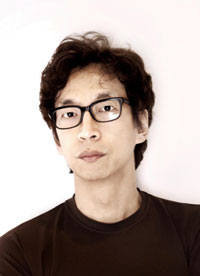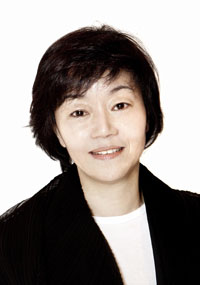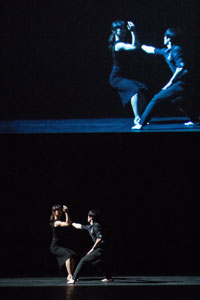Chung Eui-Sook,
Daniel H. Byun
Benois de la Danse nominee
Chung was born and raised in South Korea. She started dancing early, training in both ballet and Korean traditional dance. She received both her Bachelors and Masters Degree from the dance department of Ewha Woman's University. It was in New York Chung got acquainted with modern dance. She earned another Masters and went to complete her PhD in dance from New York University. She started choreographing in Seoul later to find her creative identity later in New York. Chung moved back to Korea and was offered a dance professorship at Sung Kyun Kwan University. In 1999 she founded her Seoul based Company, Arzid Modern Dance Company and it has been at the forefront of Korean Modern dance ever since. She also serves as a member of board of directors to numerous dance associations in Korea.
She choreographed: She is still living on a Little Ferry and Existence (1999), Four Seasons (1986), A Dance for Giselle (1994), The Color, Sound and Movement of the Seasons and Hamlet's Lover (1997), Nina's Spring (1998), Birds sitting on a pole (2000), Dong Dong (2001), A Poem of Red Soul and Light (2002), Color (2003), A Day (2005), Dancing Brooklyn Bridge (2007), Treasure Hunt, City Angel and Bag (2008), Paradise within you and Drawing 2009(2009), Madam Freedom 2010 (2010), The Bell Rings and Interview with Isang Yun (2011).
Her Prizes and Awards: Choreography and Acting award- Grand Prize A Poem of Red Soul (2002), Artist Awards — The Korean Society of Dance (2007), Korean Dance Awards — Ministry of Culture, Sports and Tourism Award for Interview with Isang Yun (2011).
DANIEL H. BYUN
Daniel H. Byun was born in Kwangju, Korea. He studied the cinema at University of Paris 8 and FEMIS, the French National Film School. He was a Recipient of the first MAMPIST scholarship, Samsung Foundation of Culture. He became a Ph. D in Aesthetics, University of Paris 1, Paris, FRANCE.
His films received a lot of attention in the Korean film scene for its unique subject matter and narrative structure. He made the film to demonstrate that camerawork itself — how and how much of a scene the camera captures — plays a crucial role in shaping a film. Daniel H. Byun conveived “cinematic performance” and applied to some dance project as Madame Freedom 2010, Interview with Isang Yun etc. He founded TMI (Trans-Media Institute) and work on 70 million KOREANS project along with well-known French photographe Yann Arthus Bertrand. His interests in documentary and real people, and his keen knowledge of music and arts in general are evident in the unique cinematic world he has built.
He is an author of Short Films, such as Homo Videocus (1991, Jury's Award and Critic's Choice Award, Clermont-Ferrand Film Festival; Jury's Grand Prix Award, Montecatini Film Festival; Grand Prize, San Francisco International Film Festival, Short Film Competition; Official Selection, Oberhausen, New York International Film Festival), Bruno Rudant, Age 34(1995, Grand Prize, Vendome International Documentary Film Festival in France); Grand Prize, Gentille Film & Video Festival, Documentary Competition in France); Birthday (1996, Official Selection, Oberhausen International Film Festival; Official Selection, Karlovy Vary International Film Festival in Czechoslovakia; Official Selection, Pusan International Film Festival in Korea), Orson (1997, Graduation thesis film, FEMIS, Official Selection, Pusan International Film Festival in Korea).
And also Feature Films: Interview (2000, the first Asian Film to be certified as Dogme Film; Official Selection, Shanghai, Gothenburg, Hong Kong and Sao Paulo International Film Festival; New Director's Award, 1st Pusan Film Critics Award); The Scarlet Letter (2004. Closing Film in Pusan International Film Festival in Korea; Official Selection, Vladivostok International Film Festival in Russia); Five Sense of Eros (2009, Film “omnibus” with 5 short films; Number of domestic audience: 965,529).
Gallery


